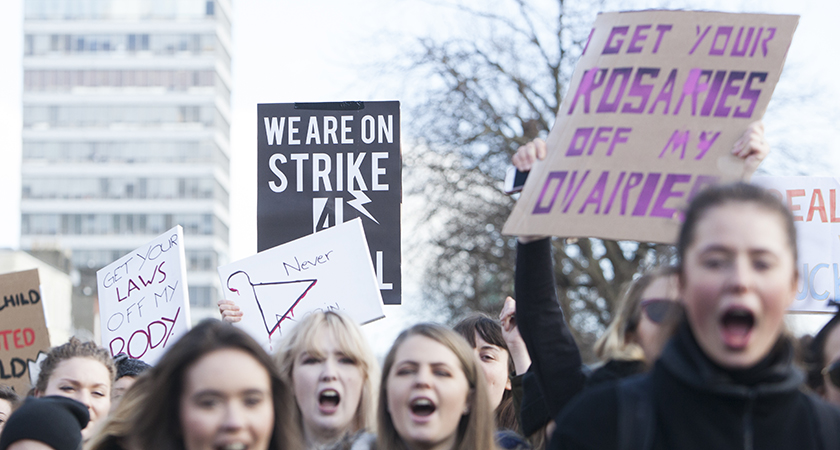EARLIER this month, an article by Irish Times journalist Kitty Holland suggested that marginalised voices were absent from Ireland's Repeal Campaign, and it had been 'hijacked' by the middle classes.
As a working-class woman, fighting for free, safe and legal abortion in Ireland this struck a chord with me.
Just days before the article was published I had a discussion along similar lines with my LIARC (London Irish Abortion Rights Campaign) colleagues.
I said I felt we needed to include more working class voices in the debate. So here I am.
I have a college degree. I work in London and I’m politically engaged. Some people may therefore assume I am middle class - but they’re wrong.
I grew up on a council estate. I’m very proud of my background. But it also means that I’ve seen first-hand how the Eighth Amendment has impacted the most vulnerable in Irish society.
My parents were 21 when I was born. My mam said I wasn’t “planned," but “always wanted."
I finished school, went to college and graduated from University College Cork a few years ago. Both my sister and I had a happy childhood, but others around me weren’t so lucky.
In my estate in Waterford, I saw girls as young as 13 get pregnant and raise the babies. At my secondary school, 15 and 16 year olds got pregnant and dropped out. I was taught about contraception in sixth year - my heavily pregnant friend in attendance.
Abortion was never really an option in my estate. Most people didn’t have a passport, let alone the money to go abroad.
This fabled ‘boat to England’ to take care of an unwanted pregnancy can cost up to €2,000 - far beyond the reach of most of my neighbours.
I’m not saying that had abortion been available in Ireland, all these girls would have availed of it.
Of course, many would have chosen to carry on with their pregnancies, but they should have had that choice. No-one should become a parent, simply because they cannot afford a termination.
Anti-choice groups infuriate me when they talk about how many babies have been “saved” by the Eighth Amendment, as if it prevents abortion.
We know 11 women a day travel to England to end their pregnancies.
All the Eighth does is put up barriers. It ensures only the affluent can avail of abortion - and ultimately results in women having babies they neither want, nor can afford.
Another argument regularly trotted out by anti-choice groups - is that there's "help" out there for parents living in poverty. However, in my estate I saw a lot of children slip through the cracks of the social welfare system.
I saw kids come to school dirty and hungry. I saw children being taken into care, given back to their parents, only to be taken away again.
I saw babies being brought up by addicts – and I’ve seen men beat their partners in the streets, while their children watched through the sitting room window.
 'Not everyone in a Repeal jumper is middle class. Working class women, like me, are out there too – fighting just as hard,' writes Laura O'Neill. Pictured above are women on the streets of Dublin protesting for the Repeal the 8th campaign. (Picture:Leah Farrell/RollingNews.ie)
'Not everyone in a Repeal jumper is middle class. Working class women, like me, are out there too – fighting just as hard,' writes Laura O'Neill. Pictured above are women on the streets of Dublin protesting for the Repeal the 8th campaign. (Picture:Leah Farrell/RollingNews.ie)Anti-choice groups claim they want to protect children - but do they ever offer practical solutions to those in need? Do they run homework clubs, offer free babysitting? Do they protest when the Government tries to cut welfare?
No, they don't seem to care what happens to women or children after birth.
Organisations like the Abortion Support Network have grown in size in recent years and now offer financial support to women and girls in need of abortion.
Mara Clarke and her volunteers hear from people so desperate they're willing to pawn their belongings or skip meals in order to pay for the trip to England.
They offer them hope - book flights, sort accommodation and cover the clinic fees. It's a lifeline for so many.
So yes, Kitty Holland was right to point out that the Eighth Amendment is a class issue – and that marginalized voices should be front and centre.
If you’re middle class, don’t be offended by that. Acknowledge your privilege and use it to help the cause. Donate to the ASN, buy the merchandise and the gig tickets.
Ms Holland was wrong, however, to assume that everyone in a Repeal jumper is middle class. Working class women, like me, are out there too – fighting just as hard.
At the end of the day, we're all on the same side and it's so important that we stay united in the months ahead.
The journey to Repeal is going to be a long one. I'm apprehensive, but hopeful.
Most importantly I trust Ireland’s women and want to see the same rights for all regardless of class.

